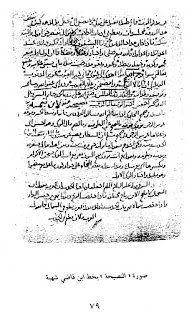An Account of the Life of One of the Greatest Traditionist, Jurisprudent and Theologian of the Hanafi School.
Abu Ja‘far Ahmad bin Muhammad bin Salamah Al Azdi, Al Hajri, Al- Tahawi, was born at Taha, a village in upper Egypt. His forefathers came from the Yemen to Egypt and settled there after it had come under the Muslim rule. There is a considerable difference of opinion as to the year of his birth. The years 229/843, 230/844, 238/852 and 239/853 are mentioned by different biographers. Al-Sam‘ani asserts that he was born in 229/843 and this is correct. He died in Egypt in 321/933.¹
Al Tahawi was mainly interested in Hadith and Fiqh, and was regarded as one of the greatest Muhaddithin and fuqaha’ of his time. According to Abu Ishaq al-Shirazi, he was the last leader of Hanafi Fiqh in Egypt.² He began to study Shafi‘i Law under his maternal uncle abu Ibrahim Isma‘il Al-Muzani (d. 264/878), the most celebrated pupil of Imam Al Shafa'i, and then leaving his school he took up the study of Hanafi Law under Al Shaykh Abu Ja‘far Ahmad bin Abi Imran (d. 285/898), who became the Chief Qadi of Egypt in 270/883. Different versions are given by his biographers of his conversion to Hanafi school, but the most probable reason seems to be that the system of Imam Abu Hanifah appealed to his critical insight more than that of Imam Shafa‘i.
Al Tahawi went to Syria in 268/882 for further studies in Hanafi Law and became a pupil of Qadi Abu Khazim ‘Abd al-Hamid bin Ja‘far, the then Chief Justice of Syria. He learnt hadith from a large number of Shaykh's especially from those who visited Egypt at his time, and had also many pupils of distinction. He is a distinguished author of many important works of which the following may be mentioned here:
1) Sharah Maa'ni Al Athar.
2) Mushkil Al Athar.
3) Ahkam Al Qur'an.
4) Ikthilaf Al- Ulama.
5) Al-Nawddir Al-Fiqhiyyah.
6) Kitab Al-Shurut al-Kabir.
7) Al Shurut Al-Ausat.
8) Sharh Al Jami Al Saghir.
9) Sharh Al-Jami Al Kabir.
10) Al Mukhtasar.
11) Manaqib Abu Hanifah.
12) Tarikh Al Kabir.
13) Al Radd Ala Kitab Al Mudallisin.
14) Al Radd Ala Abi Ubayd.
15) Al Radd Ala Isa bin Abban.
16) Hukm Aradi Makkah etc.
His original contribution to Hadith literature, so far as we can estimate, is that he introduced a new system of collecting legal traditions, developed a new method of interpreting and harmonizing the conliicting traditions, and adopted a new criterion for criticizing them. His predecessors and contemporaries, the authors of Al Sihah Al Sittah (the Six Canonical Compilations) collecting traditions according to their own standards and principles, left out a large number of genuine traditions. Al Tahawi made a strenuous effort to collect all the genuine legal traditions of the Prophet, narrated by different authorities on a particular subject, together with the opinions of the Companions of the Prophet, their Successors and the distinguished jurisprudents. He then scrutinized traditions (ahadith) and showed by evidence which of them were authentic, strong, weak, unknown, or such as might be supposed to have been repealed. Thus, his collection provided for the scholars an unprecedented opportunity to judge for themselves the merits or demerits of a particular tradition. The criterion for judging the genuineness of a tradition, according to the Traditionists in general, was the Isnad (chain of the narrators), and so they paid greater attention to the scrutiny of the isnad than to the scrutiny of the text (mam) of a tradition. But Al-Tahawi, while scrutinizing a tradition, took into consideration the main as well as the isnad of the tradition. He also aimed at a harmonizing interpretation in case of conflicting traditions.
Imam Abu Hanifah directed his movement against the Kharijites, Qadarites. Mu‘tazilites, shi‘ites, Jabarites, the extreme Murji’ites, and the Hashwiyyah³, the last being a group of the orthodox people who under the influence of the converted Jews, Christians, and Magians fell into gross anthropomorphism, and ascribed to God all the characteristics of a created being.‘ He was the first theologian among the fuqaha’ who adopted the principles and method of reasoning and applied them to a critical examination of the articles of faith and the laws of the Shari'ah. That is why he and his followers were called by the 'traditionists the People of Reason and Opinion (Ashab Al Ra'i wa-l Qiyas). This rational spirit and philosophical attitude were more consistently maintained by Al-Maturidi than by Al Tahawi. Their views on the nature of faith. attributes of God, beatitic vision, divine decree, and human freedom may be mentioned here to indicate the distinctive features of their methods.
To All the scholars mentioned in the above article, "May Allah be pleased with you All."
¹Al Sam'ani, Al Ansab, Leiden, 1912, Pg 368, Ibn Al Nadim, Al Fihrist, Cairo, Pg 292, Jalaluddin Suyuti, Husn Al Muhadarah, Vol 1, Pg 147, Ibn Khallikan, Waf'at Al Ayn, Vol 1, Pg 19, Al Dhahabi, Tadkirat Al Huffaz, Vol 3, Pg 28, 1915 ed.
²Al Dhahabi, Tadhkirat Al Huffaz, Vol 3, Pg 28, Jalaluddin Suyuti, Husn Al Muhadarah, Vol 1, Pg 147.
According to M.M Sharif, Abdullah Ibn Saba, a convert from Judaism introduced and propagated Anthropomorphic ideas among the Muslims during the caliphate of Ali. He quoted Al Shahrastani to support his claim.
⇛ The following article is written from the book, "The History of Muslim Philosophy- Vol 2," Pg 268 by M.M. Sharif.





















